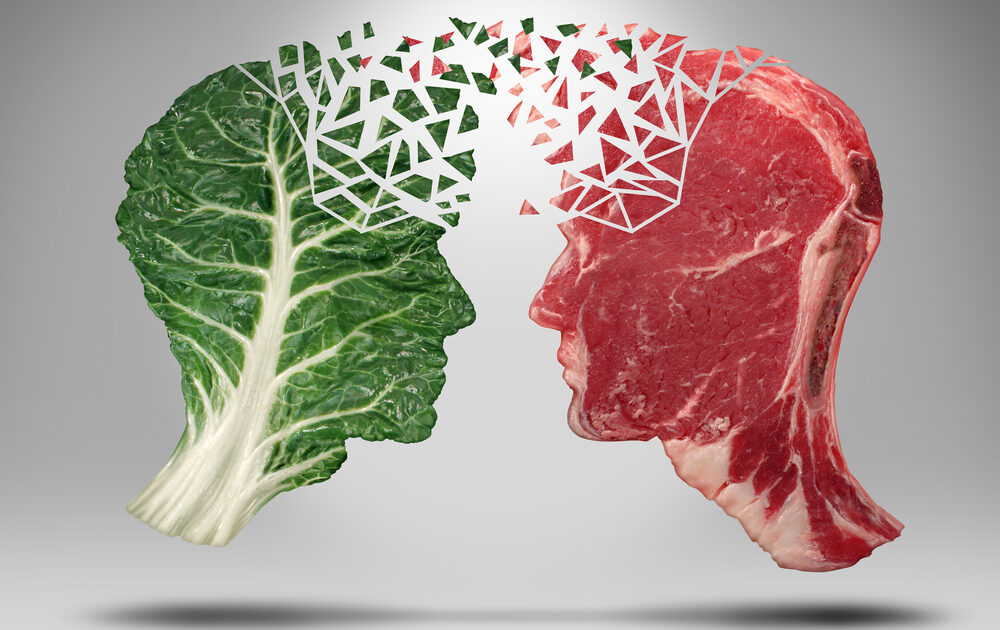Nope! Nope! Nope! Animal Meat is Not ‘Plant-Based’ (No Matter What the Animal Ate)

In a recent op-ed for the New Hope Network, Dave Carter, Executive Director of the National Bison Association, argues that meat—the stuff that comes from deceased animals— is the original “plant-based meat” because before humans eat the animals, the animals eat plants.
“Don’t get me wrong—I’m not against companies trying to artificially create some products out of soybeans or pea protein to mimic the taste of meat,” he writes. “Just don’t call it plant-based meat. Meat already owns that title.”
Carter goes on to say that eating less meat isn’t a bad thing for the planet, but he defends animal agriculture, citing that removing animal products from our food chain would result in “an environmental disaster,” a pretty bold statement and one worthy of explanation, of which Mr. Carter offers none other than the impact “hoof action” and grazing has on the soil.
He’s making the argument the vegan and plant-based movement has seen time and again—the good ol’ you-can’t-call-it-milk-meat-or-cheese-because-we-used-those-words-first.
Yes, of course, cows eats plants. Pigs, though, a popular source of meat, eat worms, and even small animals (sometimes even rather large animals). Chickens are known to eat insects. Just the other day I observed a flock of hens battling over a beetle with much more tenacity than they offered the adjacent leaf of lettuce. Tuna—a popular (and rather endangered) source of animal protein—eat other fish. So do salmon.
But what an animal eats before humans eat it is hardly the point here.
Because no matter what you call it, plant-based meats, eggs, cheese, milks, etc., all earn their rightful place—and names—alongside the we’ve-always-done-it-this-way variety of milk, meat, eggs, and cheese. Not just through the skyrocketing demand for these products (the nondairy milk category is expected to surpass $35 billion by 2024), but because these products are often indistinguishable from their carcassed counterparts. They satisfy our dietary needs, and they offer much more variety than the animal-based versions.
Credit can go to the incredible amount of research and trial and error in kitchens all across the world to make protein better, smarter, and tastier than raising and slaughtering animals. Regardless of what you eat, suggesting that eating animals is efficient is blatantly ignoring the facts.
Beyond Meat, the Calif.-based protein company, prides itself on its meatless meats that have fooled even the most devoted meat-eaters. Impossible Foods makes a burger so meaty, some meat-eaters even prefer it. Gardein has taken plant-based protein to unbelievable culinary heights (you simply have to try the meatless meatballs and the fish filets). Tofurky has been leading the plant-based protein movement for decades. And they’re just a drop in the meatless bucket.
In the cheese category, there’s no longer any question: as long as you have plant milk, you can make a damn fine cheese in the same exact way traditional cheesemakers have been doing it for centuries. It just took us this long to figure it out.
What we have now achieved in the plant-based categories is the hallmark of an evolving culture. We’re outsmarting nature and even our own dietary needs. We can grow animal cultures in a lab without the mess of slaughtering a sentient being. Mr. Carter may call this a misappropriation of a word–mere semantics–but most people call it progress. And delicious.
You can certainly call these foods by any other name–go ahead–but you cannot stop the demand. That’s because the plant-based food industry has passed the point of no return. Now with its own trade group, the Plant-Based Foods Association, bringing a voice to this massive market segment, and interest from every part of the food industry, plant-based alternatives are the indisputable new meat (and eggs, and cheese) of modernity.
They’re the evolved food products we’ve been waiting for— they’re better for our health, for our planet, and let’s stop neglecting to mention the animals themselves. Because no matter what a cow or bison or pig or chicken eats, it doesn’t change the fact that they don’t want to be eaten, whether you call it plant-based meat or not.
Find Jill on Twitter and Instagram
Related on Organic Authority
Vegan Meat is Now the Biggest Trend in the Tech Industry
You Know the Vegan Diet is Hot When QB Tom Brady Does This
Vegans Have the Last Laugh (Literally): Red Meat Linked to Earlier Death
plant vs. meat image via Shutterstock

